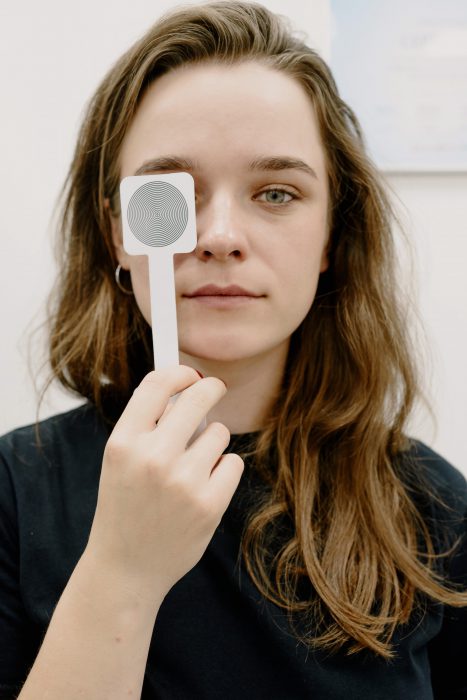

A full eye examination will take approximately 50 minutes.
An eye exam includes the following:
History: Taking a detailed eye and medical history for yourself as well as any family members.
Refraction: Checking your vision and determining your prescription for glasses
Binocular Vision Assessment: Tests how well your eyes are working together, which is especially important for evaluating depth perception and symptoms of eyestrain
Eye Health Assessment: Of pupil function, intraocular pressure, corneal thickness, and a detailed examination of your eye health using a microscope looking at all the layers of the eye: eyelids, cornea, conjunctiva, lens, vitreous, and retina.
Pupil Dilation: With eyedrops to better examine details of the lens, optic nerve, macula, retina, and blood vessels.
Retina Exam: Looks at the retina in its entirety all the way around the eyeball looking for tears and holes in the Retina; further than OPTOMAP machines.
Please bring a list of your medications, nutritional vitamins or supplements, and details of any health conditions that run in your family.
Pupil dilation allows us to perform a very thorough examination of the internal aspects of the eye. This allows us to more clearly see the lens, optic nerve, macula, blood vessels and retina.
Signs of macular degeneration can be more easily detected, and changes to the optic nerve structure can indicate early signs of glaucoma or other medical problems. It also allows us to evaluate the quality of the blood vessels inside the eye and determine whether the cardiovascular disease may be present. Eye disease can be present even without vision symptoms and can be determined by monitoring for eye health abnormalities and changes. Presently, there is no automated device available that will allow us to see the back of the eye in as great detail as a dilated manual examination.
In addition, eye health can be an indicator of medical conditions such as high blood pressure and diabetes. Changes in the eye give us a lot of information about your overall health.
Your pupils will remain dilated for a few hours after the examination. You will be light sensitive and your up-close vision will be blurred.
Please bring sunglasses, your latest prescription glasses, your contact lens packaging or specifications, a list of medications and dosages and vitamins or supplements, and your family health history details.
Your first eye examination should be at age 6 months and then once a year from the age of 3 to 19.
From ages 19-30, every 2 years is recommended unless there are eye or medical conditions that require more frequent visits, e.g. diabetics, contact lens wearers.
From ages 30-50, every 1-2 years is advised depending on the health and family history.
After age 50, annual eye examinations are recommended.
A prescription check takes about 15 minutes and only checks the prescription for glasses. Normally we recommend a full eye examination if it has been greater than 1 year since your last eye exam. A full exam includes a prescription check and a complete eye health examination. This would take about 50 minutes.
Short description contact lens examination is performed after you have worn the contact lenses for at least 4 hours.
Your vision is assessed with the contacts on and any prescription change is determined. The lens is then removed and a fluorescein dye is instilled in the eyes to check for signs of irritation or scratches from contact lens use. Signs of oxygen deprivation from contact lens over-wear can be discovered.
This assessment should be done every 6 months if you wear contact lenses on a full-time basis ie. greater than 12 hours per day. A full eye examination should be done annually.
Routine eye exams for those between ages 20 and 64 are no longer covered under OHIP. This change came into effect in 2004.
Children under the age of 19 are covered annually under OHIP for a full eye examination.
Patients aged 20 to 64 years who have any of the following medical conditions can go to their optometrist or physician and receive an OHIP insured eye examination once every 12 months: diabetes mellitus, glaucoma, cataract, retinal disease, amblyopia, visual field defects, corneal disease, strabismus, recurrent uveitis or optic pathway disease.
Patients over 65 years are covered annually for a full eye examination.
> Read more

